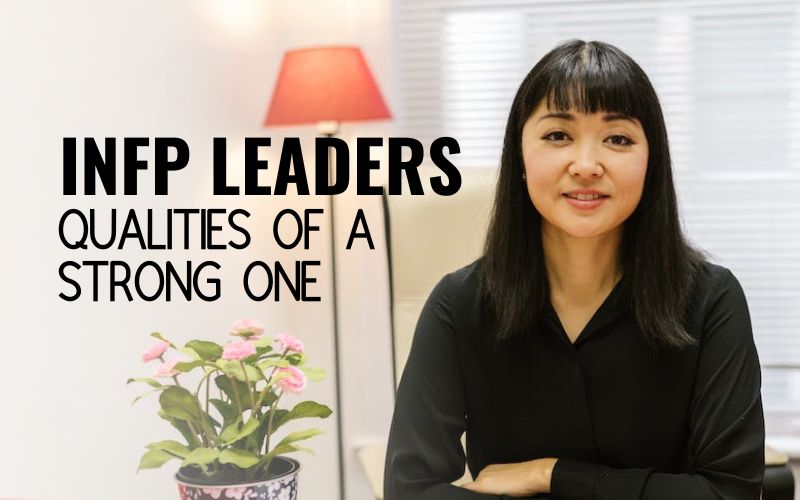Can INFPs be leaders? Oh, you bet they can. INFPs are born with natural leadership traits.
You see, INFP leadership acquires a style that society needs today — empathy and compassion.
They have every quality of an empowering and inspiring leader, but as we know, not all INFPs want to be leaders. It’s a matter of how these Dreamers use their abilities. Would they lead people, or would they lead their life?
In this post, let’s go further on INFP’s leadership roles, what makes them empowering and ideal leaders, their weaknesses, and their motivation.
Here we go!
INFP Leadership Roles
“INFPs are shy and quiet. Can they really do the job?” Let’s dig deeper.
First, INFP isn’t like the unsympathetic CEOs portrayed in the movies.
No, they are not the prideful bosses who threaten to “fire” employees.
I couldn’t even imagine an INFP bossing around a crew or telling people it’s “inconvenient” to file a sick leave.
If that’s your standard for a leader, then INFPs dramatically fail at that.
However, everyone must understand that INFPs don’t lead for fame and money. More than the exposure, INFPs pursue a more significant goal — helping others and uniting everyone to a larger purpose.
You would rarely — or probably never — see these gentle idealists running a law firm or becoming chief police.
But they can make great film directors, head writers and animators, club leaders, life coaches, or basically any role they find meaning in and agrees with their beliefs, values, and creativity.
Now let’s move ahead to the qualities that make INFPs competent leaders.
7 Qualities of a Strong INFP Leader
So people think INFPs aren’t great leaders because they possess “stereotyped” traits such as quietness, aloofness, and inability to express themselves.
But surprise, surprise, not all INFPs are like that. There are outgoing INFPs, too — confident, visionaries, and born leaders.
You might be amazed how people adore and love their INFP leader for the earthy charisma, humility, and reliance.
So what makes INFP great leaders? Here are the qualities everyone might be surprised about:
1. INFP leaders are powerful visionaries.
One of INFP’s core strengths as a leader is their high intuition. They’re so intuitive and future-oriented that they can turn any circumstances — whether good or bad — into favorable opportunities.
Their clear vision of idealistic goals makes them stand out.
The visions are vivid — like a movie in their minds, a showpiece of scenes stuck on replay.
Because they quickly perceive the big picture, INFPs can figure out an abstract checklist of what they need, who will do it, and the steps they should take to ensure a successful plan.
Most importantly, a plan formed from their idealism brings forth true change once realized.
2. They see flaws a mile away.
INFPs could be critical at times, too. Because they have a quick perception of the whole picture, they can see the flaws a mile away.
When faced with a problem, their intuition instinctively navigates future paths to find errors and consider possible approaches.
They’re always trying, researching, and self-reflecting on something new so they can spot ineffective methods before anyone else.
Here’s how an INFP thinks:
INFJ friend: Let’s go play airsoft this month!
Others: YEAAAH!!
INFP leader: *takes time to gather thoughts* (thinks and considers about the rainy weather, airsoft rules and the fees, how everyone is introverted, all are newbies, that not everyone is high on physical activities, and all are girls.)
INFP leader: That’s really great! But… *proceeds to mention the cons*
Others: Oh, right.
INFJ friend: What about skating?
INFP leader: That’s more like it! I’ll get the tickets to the rink!
INFP leader and everyone: YEAAAHH!!
3. INFP idealism is remarkably contagious.

INFPs can lead teams because they have a knack for seeing what needs to be done, and then finding innovative solutions. Leave an INFP with paper, pen, and strings — you never know where their imagination will take them!
Their idealism is so alluring.
Their ideals and burning passion become contagious as people realize that these visionaries don’t speak words they don’t genuinely believe in.
Once they present you a plan, it’s too compelling to not approve since INFPs will take you two steps deeper into why they came up with it.
They give you reasons after reasons — always leaning on the whys.
An INFP who strongly believes in a plan draws attention and can create an army of believers.
Ahh, in a world of dull corporate jobs, we absolutely need a word from these magical unicorns.
4. INFP leaders are mentors who reveal your untapped potential.

INFP leaders will meet you where you are at. They won’t scold you with a “do your frickin job!” or “get it done at 5 or else!”
Instead, INFPs are best for evaluating people’s strengths. Do you believe these gentle souls can easily see your blind spots?
They can.
Their keen observation and passion for understanding human subjectivity help them map out your emotional wavelength. And yep, that includes weaknesses and insecurities.
But instead of scolding your mistakes or calling out your blind spots, seeing you do your best is enough of a signal for them to lend you a helping hand.
They will help you where you lack.
INFP leaders be like, “this guy really works hard. Time to give him my all-out support.”
What is more, INFP leaders have a heart for underdogs. And when I say they help you all out, it’s ALL OUT.
Your success is their success.
Once INFP leaders admire your determination, they stay with you for emotional support. They help you with tasks, send all the resources, share their secret methods, and provide templates to speed up your growth.
But most important of all, they’re so willing to do it for free!
“If you win, I also win.”
They invest time in you, not for fame and money, but for their own self-fulfillment.
It will be no surprise if an INFP leader gives you extra focus and training to push that untapped potential out.
INFPs are not only leaders. They’re trainers and great mentors who hold the mirror for you, so you can see yourself not for how vulnerable you are today but for how skilled, strong, and powerful you can become.
They don’t only tell you what to do, but why you do it.
Empowering. Really empowering.
5. INFP leaders maximize performance through emotional proficiency.
INFPs create a positive and motivating work environment where people feel valued and appreciated. It’s founded on trust and respect.
Not every personality type could get a hold of one’s emotional pulse. Yet, INFPs can, and connecting to people at a personal level is one of their core strengths.
While the world sees commando-type leaders as role models, it’s the compassionate ones that attract evergreen admiration.
According to a Harvard Business Review, employees highly demand compassion. But many company leaders are tone-deaf about how such “compassion” works, considering that they don’t want to sacrifice outcomes and numbers.
But that’s not the case for INFP leaders.
If they could compensate you more, and let you live in comfort after the busy season, they would do it.
Why? It’s because INFP leaders always live in other people’s shoes. They want to treat people the way they want to be treated.
They don’t like toxicity and pressure, either. Thus, they will find ways to lift your burden in a way that works for both parties.
6. To INFP leaders, hierarchies are annoying.
Mutual respect is of the highest value. INFP, as leaders, know their responsibility, but rest assured that they don’t use it to overpower or scare others.
Leadership that builds a gigantic wall between leaders and the team is exhausting for an INFP.
Before, I got a job where my mentor emphasizes how I should draw a line between myself and my trainees, that I have to look respectable and always be a role model.
But that’s probably the most torturing job I ever had because, for years, I needed to keep a reputable front, even when I’m a goofball who’s a child at heart.
I left that job, but it’s still impacting my confidence up to this date since it triggered a whole new level of self-consciousness and “fakeness” in me.
Hierarchies are annoying. It draws the line between what people can and can’t say. It triggers unnecessary anxiety.
Also, INFPs dislike the hindrance or arrogance a person shows because of their job title.
It’s like, what gives you a ticket to “talk down” to others? Is it because you’re a manager? Ugh. Doesn’t make sense.
What INFP leaders do is listen to everyone and gently give a spotlight to those who hide behind the curtains. They yearn for collaboration and love that everyone is involved in the process.
I assure you that once people speak without arrogance and aggression, INFPs will take their suggestions to heart and generate ideas to solve their concerns.
And as a team member, knowing that the leader hears you significantly lift the team’s morale.
Moreover, even when INFPs are cautious about their personal life, they can be as transparent and honest as they can when discussing goals and strategies.
INFP leaders are people of purpose. They don’t settle teaching textbook knowledge but also share the wisdom that goes beyond.
7. INFP leaders celebrate like a child.

One of the best leadership qualities of an INFP is their thumping gauge meter for appreciation. They’re not hard to please.
Here’s how their appreciation gauge works:
Say you’ve given output to your INFP boss. As they go through your work, they don’t go to the technicals first. No, they don’t!
Your work gets rated first based on how much time, effort, and level of expertise you put in. The more INFPs imagine your challenges and see you triumph, the more they appreciate you.
As for me, an INFP who checks people’s outputs, I confess that I sometimes don’t stick to my primary instructions. (Oops, this is why some INFPs like me can’t be good at clerical work.) If I see someone “trying,” it already calls my attention and I easily give out appreciation.
That’s how INFPs are. They love how people put their heart and soul into a project, more than the project itself.
They’re optimists and bouncy people who cheer for you out of genuine amazement.
INFPs go above and beyond to ensure that their appreciation is shown. Whether it’s through verbal encouragement or recommending you for other jobs; these idealists always make room for plenty of praise!
On the other hand, INFPs can be ruthless, too. Once you show them half-hearted, copied, or unoriginal work, you can see the depths of their disappointment.
They don’t tolerate dishonesties. They would watch you closer, see if you will commit the same offense the second time, and can cut you off from the workforce if you’re caught.
You don’t wanna pull a raw nerve against their values, or else you’ll wake up the sleeping bears.
Struggles of an INFP Leader
Even the greatest minds and leaders aren’t perfect. With INFPs, especially those who are yet to develop the skill, may struggle with these weaknesses:
1. INFPs are all in or all out.
This may be a weakness for an INFP leader — they don’t do jobs halfheartedly.
An INFP who is not interested in a task may easily lack focus and motivation. Their job must be purposeful, or they will lose the shine in their eyes.
The solution: INFP leaders should delegate the tasks to more skilled employees or members rather than zombie-ing through a job.
2. They have difficulty trusting others with important tasks.
In fear of not reaching their personal standards, INFPs would do everything themselves instead of trusting other members to do the job.
In my experience, when I don’t like the delivered job, I’ll redo everything from scratch and feel robbed of my time and money. After that, I’ll stop trusting other people with tasks I find important and do everything myself.
In the end, INFP leaders take too many responsibilities at once, resulting in burnout and internal complaints about why they have so many backlogs.
3. INFP as team leader may struggle with confrontation and giving negative feedback.
INFPs are used to being the peacekeeper in the group. But what if their team has conflicting interests and they’re torn between two clashing sensible reasons?
4. They can be susceptible and take feedback personally.
Sensitive? They sure are. INFPs often take feedback personally, even when it wasn’t meant that way. This can make them seem thin-skinned and weak to others.
5. INFPs struggle with mundane and clerical tasks.
Administrative work or data entry? There’s no room for creativity here.
INFP leaders prefer jobs that involve creative problem solving and making a meaningful impact. If a task isn’t interesting, they may procrastinate, be bored with tasks, or feel trapped. This is the perfect time to hire or delegate tasks to people who can fill the jobs.
Are INFP Leaders or Followers?
Many think INFPs are incapable of leadership and actively seek a follower role. But in truth, INFPs can take leadership or follower roles as long as the team leads a path that resonates with their values.
When leading others, INFPs are more likely to inspire by example than by issuing directives. While INFPs may not be the most forceful leaders, they can be immensely effective in mobilizing others to action.
As followers, INFPs can be passionate allies and supporters, especially in a cause they believe in. They prefer to work behind the scenes, but their dedication and vision can inspire others to action, too.
With the right leadership, an INFP can be a valuable asset to any team.
Final thoughts
So, do INFPs make great leaders? The answer is a resounding “yes!”
If you are an INFP considering a career in leadership, or if you are managing a team, I hope these tips empower you even more.
You’re doing great!
The truth is, it’s breathtaking for me to write this post as it stirs my passion for teaching and mentoring people.
I know how inspiring INFPs can get. I’ve seen people reach out to their INFP leaders because these idealists are reliable and compassionate.
So who told you INFPs can’t be leaders? In my perspective, INFPs are born to be one.
What has your experience been working with or being led by an INFP? We would love to hear from you!
Thanks for reading!
-M.Mathias
Was this helpful? You can buy me a coffee to show your support!
You may also like:
- 5 Tips to Become An Outgoing and Extroverted INFP
- 15 Things to Describe What It’s Like Being An INFP
- 5 Exciting and Amusing Advantages of Being an INFP


A must-read for INFPs who may not believe in themselves!